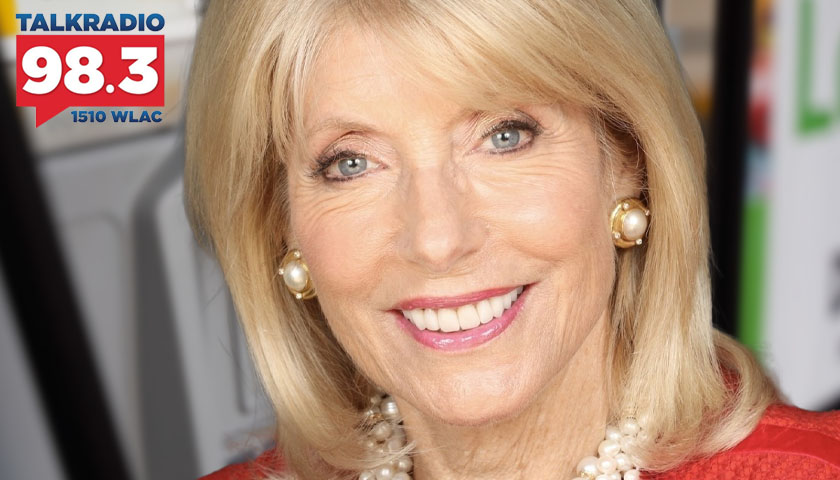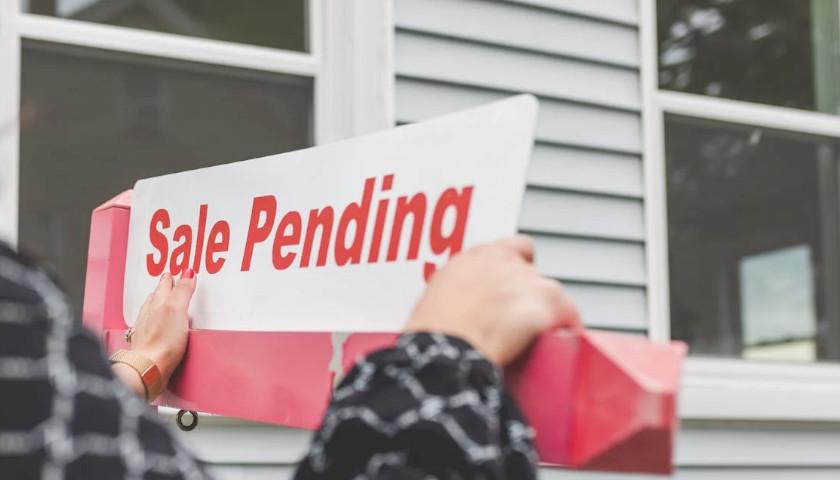Live from Music Row Monday morning on The Tennessee Star Report with Michael Patrick Leahy – broadcast on Nashville’s Talk Radio 98.3 and 1510 WLAC weekdays from 5:00 a.m. to 8:00 a.m. – host Leahy welcomed by Fox Business contributor and Wall Street expert Liz Peek on the newsmaker line to discuss Friday’s stock market downturn, inflation, and the nomination of Saule Omarova.
Leahy: We are joined on our newsmaker line now by our very good friend, Liz Peek, the finance expert at Fox News. Liz, what happened on Friday to the stock market?
Peek: (Chuckles) I think a couple of things. Obviously, the emergence of a new COVID strain that seemed to spread very quickly and threatened to shut down at first Europe and possibly the United States again caused people to have the jitters.
But look, these markets have gone up 20 percent a year for a couple of years here, and that is not normal. I think we have to kind of take a step back and just say, yeah, earnings have been unbelievably good.
Everything is terrific. But there’s some froth in these markets, and I think you can see it in the money going into other kinds of assets like NFPs and Crypto and so forth that just sort of denotes a market that’s pretty well valued.
So I just think it was possibly a welcomed tick down in terms of people stepping back and saying, okay, really, what is this company worth? What are we looking at? And by the way, inflation is not necessarily every company’s friend.
Some companies will do well in inflationary periods. They’re going to be able to price their product, others are not. And I think there’s been remarkably little analysis of how three decade-high inflation is impacting companies.
We haven’t really seen much talk about that. But I think analysts and investors have to start getting a little bit wary about the idea that everybody’s going to continue to report really terrific earnings.
Leahy: The Dow on Friday was down 905 points, 2.5 percent. The worst day since October of 2020. I see on CNBC that futures have gained 215 points, so gained some back this morning.
Peek: Yes. I looked at that also. But again, it wasn’t just stocks that were down. Everything was down, including oil, which had a huge drop of 13 percent. And again, that really reflects the number one concern that oil prices had gone too high too quickly.
But also if we enter into another period of business and even if there are no lockdowns of consumers being wary about going to stores, about going on vacation, I think it was just a collective, oh, God, don’t let this happen again feeling on Friday.
But it does have economic consequences. Look, the economy is in pretty good shape, the things that are not in good shape, consumer sentiment, consumer sentiment, even before this latest variant was in the news, was unbelievably terrible.
It was like down in the mid-60s, which we haven’t seen since the financial crisis, and in fact, rarely got to that level even then. And that was a period, as you remember, which was really horrifying in terms of the impact on the economy. So consumers are discouraged.
They’re discouraged because they’re worried about inflation because wages are not keeping up with inflation. And I honestly think and I know this sounds political, but I think it’s true that when you have a President whose approval ratings in some polls anyway, are in the 30s.
People are discouraged to think that there isn’t the leadership to confront whatever challenges lie ahead. Whether that’s a new variant or whether it’s inflation, people have kind of given up on this President being able to fix what’s wrong.
So I just think there was a sort of an accumulation of a lot of anxieties on Friday. My guess is it won’t persist. But, look, we’re all worried about this new variant, and it doesn’t look like it’s terribly deadly, but it does look like it’s wildly contagious.
And if it gets to this country, which it probably will, particularly because Biden postponed shutting down flights from Africa for several days for no reason that I can figure out. It may have an impact on the economy in the next couple of quarters.
The next couple of quarters look very good in terms of incredibly fat monetary policy continuing to drive spending. Earnings look very good for the next couple of quarters, but it’s taking a little bit of a froth off of those trends that I think maybe people are worried about.
The final thing, though, on Friday, we have had a really distinctive turn in Fed sort of policymaking and thinking over the last three weeks. And if you listen to Bloomberg Radio as I do and read all the financial press, we’ve gone from JPAL saying, oh, you know, sometime in 2022 or 2023 we’ll raise rates.
Now people are really booking that in for even the second quarter of 2022. There has been a marked change of attitude that the Fed has let monetary easing go too far too long which is definitely feeding inflation. Everybody knows it.
And Powell has to do an about-face here. Now that he’s been nominated to be reappointed, which was, I think, unfortunately, part of his thinking maybe. Now I think he is free to do that.
And I think investors are saying, okay, we have been backed by this huge flood of money from the Fed for two years. Now it’s time to reassess what some tightening could look like.
Leahy: Now, I know you cover economics and not politics directly. But the Biden administration nominated for the controller of the currency (Peek chuckles) Saule Omarova. Born in Kazakhstan, then part of the Soviet Union. Got her Ph.D. from Moscow State University and wrote a very favorable dissertation on Marxism.
That woman. She wants the Fed to take over all bank accounts. It looks like she’s not going to make it. Gee, that’s too bad. What would have happened to financial markets if she had been confirmed?
Peek: It’s unimaginable. I mean, truly, it’s unimaginable. People need to understand that this is not some little wonky by the corner of sort of Edie of financial regulation. This is where banks are regulated. And this woman basically wanted to get rid of private banking.
It was such a ludicrous appointment that is, of course, immediately sparked concerns because of her outrageous enthusiasm for Marxism, as you point out.
But the fact that the Biden administration stuck with the nomination even after she encountered a lot of pushback, not just from Republicans, but also Democrats on the various committees that would appoint her, it was ludicrous to me.
And sort of a typical Biden White House misstep. I don’t know honestly who’s guiding this White House, but this was such a stupid thing. But I should say this. This appointment and sort of the prospect of her weighing in on various regulatory matters that are of concern is important because basically the left and the Biden White House wants to use the banking system to promote various issues like climate change, which are not going through normal congressional.
They can’t get any traction in Congress or at least not much. So what they want to do is say, okay, you’re a bank. We’re going to give you stress tests every year, which is what happens.
But now we’re going to add an extra element, and they’re already doing this where if you have too many loans out, for example, in the oil and gas industry, we are considering that a high-risk loan because we know in our great wisdom that we are no longer going to be using oil and gas several years from now. And so how are those loans going to be paid back?
This woman would have taken that kind of thinking on steroids. But believe me, it is something already in the works that the Biden administration wants. And the Fed is talking about the Federal Reserve making credit allocations and decisions and sort of determinations based on, to some degree, what priorities the left has. For example, they could also cut off credit.
If Omarova were in this position, she could arrange to cut off credit to gunmakers. That’s something that the left would applaud. But it is a huge interference, obviously, in our free markets. And her nomination was sort of again accelerating a trend that already is in place where banking regulation is being used and the Federal Reserve in ways that they were never meant to be.
The Federal Reserve is now talking about all kinds of priorities. They’re not just looking at wages anymore or employment, inflation, employment, which is their dual mandate. They’re now thinking about things like equity and racial equity and climate change and other mandates that they have no business even talking about.
So I think everyone needs to be sort of on high alert to this. But the Saule Omarova nomination, thank the Lord, at least, has been sidetracked, and I think we’ll not get through.
Leahy: I think you’re right. But to me, it tells me that the Biden maladministration is, in essence, out to destroy the free market, and that’s not a good thing.
Peek: No, I agree. They certainly don’t like it. And of course, it’s a stalking horse also for the Biden administration right now, they’re under gun for their mishandling of inflation. And they really have bungled the fight against inflation pretty profoundly.
But their answer to that is sort of a typical Obama-Biden kind of response, which is, oh, oil prices are high, so oil companies must be colluding to keep gas prices at the pump where they are. No, that’s kind of how the industry works.
Leahy: Last question for you, Liz Peek. Are you ready?
Peek: Yes.
Leahy: When are you and your family moving to state income tax-free Tennessee because we got a place for you here. (Peek laughs)
Peek: I know. It’s very tempting. I’ll tell you, I think we must be the last people in New York who are actually earning a living. (Chuckles)
– – –
Tune in weekdays from 5:00 – 8:00 a.m. to the Tennessee Star Report with Michael Patrick Leahy on Talk Radio 98.3 FM WLAC 1510. Listen online at iHeart Radio.
Photo “Liz Peek” by Liz Peek.





